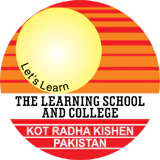- Home
- Evaluation & Exams
Evaluation & Exams
The Learning School employs various assessment methods, including class tests, terminals, central terminals, and annual examinations.
Furthermore, progress reports are personally handed to parents to ensure they are well informed about their child's performance. Alongside these evaluations, assessment criteria encompass regular classwork, homework assignments, participation in co-curricular and extra-curricular activities, and proficiency in information and communication technology.
In the annual examinations, the entire year's curriculum is evaluated. The examination format allocates 20% weightage to the syllabus from the first term, 30% from the second term, and 50% from the final period. Students who fail twice face expulsion from the school, with staff also having the authority to recommend a student's transfer to the board of governors due to weak performance.

Examinations at The Learning School serve various objectives, primarily focusing on:
- measure the effectiveness of the teaching/learning process;
- measure the students’ present levels of achievement;
- measure the students’ progress for future selection or promotion to the next class.
- provide information for streaming purposes;
- evaluate the relevance of the curriculum, and
- measure progress towards the accomplishment of national goals.
Student examination data serves various purposes beyond assessment. At the school level, this data is a cornerstone for vocational and career guidance offered to students. Furthermore, these examinations optimize the utilization of physical and human resources and facilities available across schools.
Type of Examinations:
Public / board examinations:
The Learning School implements a standardized examination system to align with local board assessment procedures. This includes designing achievement tests, conducting trial examinations ("sent ups"), developing marking schemes, coordinating and moderating the grading of examination scripts, and establishing guidelines for crafting examination papers.
School-based summative examinations:
The school administration conducts various examinations, including monthly tests covering all subjects, class tests assessing weekly performance, and criterion-referenced tests. Class teachers often create tests that require assessing students across different sections within the same grade. To ensure fairness, the school employs norm-standardized difficulty levels. These examinations serve multiple purposes: they evaluate both teacher and student performance, while also aiding the administration in identifying standout students within each cohort.
Formative examinations:
These assessments, also known as continuous assessments, consist of weekly, monthly, and term class tests, projects, and regular assignments assigned by subject teachers. They serve to alleviate the pressure of high-stakes exams on students. While the results of these assessments may not contribute to the final aggregate score, they greatly aid students in preparing for their ultimate tests.
Evaluative examinations:
Our evaluative examinations are crucial in assessing students' progress and readiness for admission and graduation from our school's learning activities. These assessments gauge students' knowledge and skill development, reflecting their ongoing learning journey.

Through our examination and evaluation system, students are empowered to:
- Set higher expectations for themselves
- Build confidence in their abilities
- Expand their knowledge base
- Engage more actively by asking questions
- Enhance their English language proficiency
- Stay focused on tasks and develop skills essential for success in life
Moreover, our examination procedures benefit our teachers by:
- Utilizing curricular targets to enhance language development and curriculum access
- Analyzing student achievement targets in detail
- Excelling in professional development
- Conducting self-analysis of teaching practices and knowledge
- Providing planned opportunities for speaking and listening
- Prioritizing speaking and listening as foundational skills for writing
- Planning and implementing techniques to advance mathematical skills
- Fostering interest in science and environment-based technologies
- Analyzing assessment tasks and results to identify areas of difficulty for students
- Monitoring student progress and setting relevant targets
- Supporting low achievers to reach their potential
- Encouraging teachers to step out of their comfort zones and embrace challenges
- Ensuring compatibility with classroom routines, curriculum requirements, and educational approaches.
